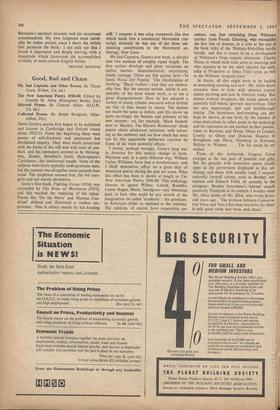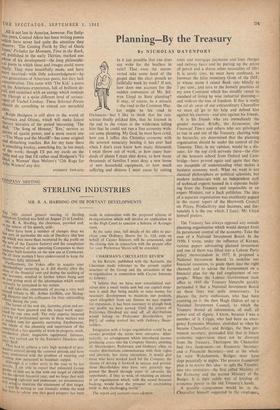Good, Bad and Chaos
The New American Poetry 1945-60. Edited by
27s. 6d.)
Collected Poems. By Ralph Hodgson. (Mac- millan, 21s.) THOM GUNN'S poems first began to be published and known in Cambridge and Oxford round about 1952-53. From the beginning these were poems of self-discovery and passionate but disciplined inquiry. They were much concerned with the limits of the will and with rules of con- duct, and his exemplars seemed to be Heming- way, Donne, Stendhal's Sorel, Shakespeare's Coriolanus: the intellectual toughs. Some of the subjects were fairly typically undergraduate ones, but the manner was altogether more assured than usual. The toughness seemed true, the wit ener- getic and not merely decorative.
Gunn's first book, Fighting Terms (1954), was succeeded by The Sense of Movement (1957), and this marked the maturing of his talent. Poems like 'On the Move' and 'Human Con- dition' defined and illustrated a restless em- piricism: 'One is always nearer by not keeping still.' 1 suppose it was crisp statements like that which made him a convenient Movement con- script; certainly he was one of the three out- standing contributors to the Movement an- thology, New Lines.
My Sad Captains, Gunn's new book, is divided into two sections of roughly equal length. The first section develops and plays variations on earlier themes: disenchantment, uncertainty, lonely courage. There are fine poems here-1n Santa Maria Del Popolo,"The Annihilation of Nothing,' Black Jackets'—and they are memor- ably fine. But the second section, which is pre- sumably of his most recent work, is to me a great disappointment. Here he has adopted a variety of purely syllabic measures which dribble on, line to line, stanza to stanza. The themes are much the same as before, and this shows up quite startlingly the flatness and paleness of his new manner: set, for example, 'Black Jackets' next to `Blackie, The Electric Rembrandt' (both poems about adolescent initiation, with tattoo- ing as the emblem) and see how much has been lost by this apparently deliberate rejection by Gunn of his most powerful effects.
1 blame, perhaps wrongly, Gunn's long stay in America for this radical change in form. Whitman and, in a quite different way, William Carlos Williams, have had a revolutionary, and I think destructive, effect on a great deal of American poetry during the past ten years. What this effect has been is shown at length in The New American Poetry 1945-60. This anthology chooses to ignore Wilbur, Lowell, Roethke, Louise Bogan, Hecht, Snodgrass—any American poet, in fact, who could by any stretch of the imagination be called 'academic': the palefaces, in American cliché, as opposed to the redskins. The redskins, of course, have respectable an- cestors, one line stretching from Whitman, another from Pound. Ginsberg, who exemplifies
the first line of descent, in a note at the end of the book talks of the 'Hebraic-Melvilliao bardic breath, and this is meant to be a development of Whitman's 'large organic structures Charles Olson, in whom both lines seem to converge and who appears to be the chief theorist for both— talks of Projective or Open Field verse, as well ; as the Williams 'irregular foot.'
In theory, all this might seem to be leading to something exciting and new: Mr. Allen draws attention here to links with abstract expres-F sionist painting and jazz in America today. But,
almost without exception, the actual poems are painfully half-baked, ignorant and verbose. They are also depressingly dull and bewilderingly similar. The incestuous heel-treading can per- haps be shown, at one level, by the number of cross-dedications to other poets in the anthology and the references to one another in their poems: Jones to Kerouac and Olson, Olson to Creeley, Creeley to Olson and Duncan. Duncan to Broughton and Olson, Ginsberg to Kerouac, Meltzer to Wieners. . . The list could be ex- tended.
From all this mishmash, Gregory Corso emerges as the one poet of possible real gifts.
But his genuine wild innocence seems fatally
open to the perversions displayed in this an- thology and those with smaller (and, I suspect, naturally formal) talents, such as Brother An-
toninus and Edward Field, sit uneasily in the company : Brother Antoninus's 'Advent' sounds
positively Ninetyish in its context. I wonder what Mr. Allen thinks of Mr. Eliot, who wrote forty- odd years ago: 'The division between Conserva- tive Verse and Vers Libre does not exist, for there is only good verse, bad verse, and chaos.' All is not lost in America, however. For forty- rive years, Conrad Aiken has been writing poems which have never had quite the attention they deserve: The Coming Forth by Day of Osiris Jones,' Preludes for Memnon, Time in the Rock, all published in the early Thirties, marked one Phase of his development—the long philosophi- cal poem in which ideas and images could move ,freelY. They were beautifully made, and have been quarried—with little acknowledgment—by two generations of American poets; but they lack concentration. This came with 'The Kid,' a poem on the American experience, full of brilliant de- tail. and sustained with an energy which reminds me (though at a quite different level of serious- ness) of Vachel Lindsay. These Selected Poems should do something to extend our parochial
gaze.
Ralph Hodgson is still alive in the world of Kerouacs and Olsons, which will make future literary histories of the period interesting. The Bull,' The Song of Honour,' Eve,' survive as Poems of quaint power, and a more recent one --The Muse and the Mastiff'—has some original and disturbing touches. But for my taste there Is something booksy, something fey, in too much of the work; though I'll put my cards on the table and say that I'd rather read Hodgson's 'To beck a Woman' than Meltzer's `12th Raga for 01111 Wieners' any day.
ANTHONY THWAITE



































 Previous page
Previous page